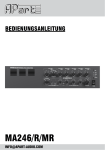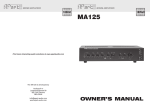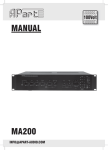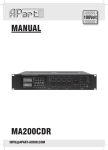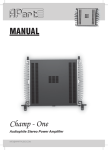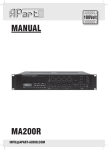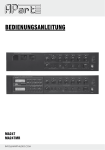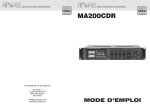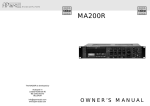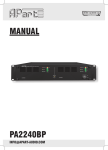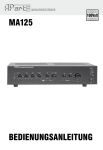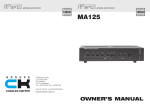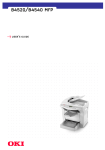Download APart MA246 AV receiver
Transcript
MANUAL MA246/R/MR [email protected] Main features The MA246 sets a new standard as a professional 6 zone PA mixing amplifier/preamplifier for commercial and industrial applications, either as a standalone unit or as the central device in an expandable, simple but clever paging system. The amplifier is equipped with 4 balanced mic/line inputs, each with adjustable gain and tone controls and up to 4 line level inputs and an emergency input. The MA246 has a six level priority system. The emergency/telephone input has the highest priority and is activated by switch or vox circuitry. Its signal goes directly to the main amplifier, bypassing any level control accessible at the front of the unit, and an attenuator next to the input sets its level. Microphone input 1 has the second priority level, followed by the mic 2, 3 and 4 and finally the line signals (music). Zones 2 to 6 can be individually volume controlled using the integrated speaker volume controls. Please note that zones number 5 and 6 are 70 volt outputs, these are compatible with 100 volt speakers, but by nature, these outputs will have a slightly reduced output level, meant for the ‘quiet’ zones in a multizone system. For even more flexibility, zone 1 is an independent zone, with a separate line level output, which turns the MA246 into a true 2 zone mixing amp with integrated preamp. During paging, the corresponding integrated volume control will be automatically bypassed. When any priority has been activated, integrated 24VDC supply output (max 0.6A) can activate priority relays of loudspeaker attenuators or other devices. Even an emergency 24 VDC supply input is present on the unit. The supply will automatically keep the amplifier powered when mains power is interrupted. Mic input 1 is optimized to be used with our MICPAT-6, a selective paging station 6 zone microphone. This mic is the master mic. Maximum 5 of these mics can be switched in parallel on this single input ! Mic input 2 - 4 are designed to be used with our MICPAT-2 (2 zone groups) microphone or any other microphone denpending on the application. On the MA246 unit you can preset 2 paging groups to be paged with mic 2 – 4. Please note that it is not possible to connect multiple MICPAT-2 mics on the same input. That’s not all. If you are a professional installer, you will appreciate the possibility to use an external amplifier as paging amp. Why ? Suppose zones 2 and 3 should not receive paging messages, meaning there should always be background music. Then you can use an external amp for all paging tasks. MA246 does all the switching and thinking for you. The internal amp will be used for background music. When a paging message is sent to other zones than zone 2 and 3, zone 2 and 3 will stay connected to the internal amplifier and will continue to enjoy the music. All other zones will hear the paging message: the MA246 will disconnect these zones from the internal amp and will send the paging signal to the external amp. The external amp will feed the signal to the selected zones via the MA246. When paging is finished, the zones will automatically be switched back to the internal amp. We will show an example of such application in this manual. We will use a 2 channel PA2240BP amp and a MA246 in an application that would normally use at least twice as much units to do all the switching and signal routing. A unique new switching circuit design has been applied to ensure trouble-free switching during many years. Removable 19” brackets are shipped along with your amplifier. The MA246 complies with the CE standards. 2 WWW.APART-AUDIO.COM Front panel 1 2 3 15 16 17 4 5 6 18 19 20 7 8 21 9 10 11 12 13 14 22 23 24 1. Zone 1 output level: this level control sets the output level to the zone 1 preamp output. 2. Zone 1 paging led: this led lights up when zone 1 is being paged. 3. Zone 1 music selector: selects the line level input for zone 1. 4. Zone 2 paging led: this led lights up when zone 2 is being paged. 5. Zone 2 level control: this control is used to preset the zone 2 level in relation to the other zones. 6. Zone 3 paging led: this led lights up when zone 3 is being paged. 7. Zone 3 level control: this control is used to preset the zone 3 level in relation to the other zones. 8. Zone 4 paging led: this led lights up when zone 4 is being paged. 9. Zone 4 level control: this control is used to preset the zone 4 level in relation to the other zones. 10. Zone 5 paging led: this led lights up when zone 5 is being paged. 11. Zone 5 level control: this control is used to preset the zone 5 level in relation to the other zones. 12. Zone 6 paging led: this led lights up when zone 6 is being paged. 13. Zone 6 level control: this control is used to preset the zone 6 level in relation to the other zones. 14. Level indicators/clip-limit: The protect led lights up during startup during a few seconds, or when an error occurs, such as overheating or overload. The lower green LED will light to indicate that power is present. The signal led indicates that a strong signal is sent to the power amp. To work within normal conditions the volume indicator should be kept under 0dB (100%). At -2,5dB a limiter will be activated. This red LED indicates that the “auto gain circuit” keeps the level below clipping. This is NOT a clip indicator, but an indication of the “automatic gain control”. Set your max levels so that the limiter led never lights up ! 15. Zone 2 – 6 music selector: selects the line level input for zones 2 - 6. 16. Music bass tone control 17. Music treble tone control 18. Music level control: turn this level knob to adjust the music level relative to the microphone signals. 19. Music muted by priority led: this red led lights up when the music is muted by any priority signal or priority contact. When this led lights up, there is 24 VDC/0.6A available on the rear connector. 20. Mic/Line 2 level control: turn this knob to adjust the mic/line 2 level relative to other signals. 21. Mic/Line 3 level control: turn this knob to adjust the mic/line 3 level relative to other signals. 22. Mic/Line 4 level control: turn this knob to adjust the mic/line 4 level relative to other signals. 23. Master level control: turn this knob to set the global level in zones 2 – 6. 24. Power switch : switch mains power on and off. This switch turns off the amplifier when connected to the mains AC supply. Please note that this switch does not switch the amp off when operating from a 24 VDC emergency power supply. 3 [email protected] Important information Zone 2 - 6 level controls are used to preset levels in different zones relative to each other and to switch off certain zones temporarily. Zone 5 and 6 outputs are 70 volts speaker line level outputs, these are fully compatible with 100 volt speakers but will produce a maximum output level about 3 dB lower than normal 100 volt lines. Use these outputs in the most silent zones. When using an external paging amp, all speaker outputs from the selected zones are switched to maximum volume (100 volt) during paging, in other words, the zone volume controls from zone 2-6 are bypassed. A maximum of 180 watts speaker load is allowed per zone, with a total maximum of 240 watts for all zones when using the internal MA246 power amplifier only. Do not overload the amplifier. If the amplifier is overloaded, it will result in overheating the amplifier. Check your total speaker load with an impedance or wattmeter before operating the amplifier. Minimum total speaker impedance (all zones combined) is calculated like this (100 V x 100 V) / 240 W = 41.66 ohms. Please note that impedance can NOT be measured with a normal multimeter, you need a special impedance meter or 100 volt line wattmeter for this purpose. In case you need more speakers and/or more power, use an external power amplifier for this purpose. The MA246 has a separate preamplifier circuit for zone 1, and a combined pre-out/amp-in connector for all other zones, allowing you to increase the total output power without the need of a supplementary preamplifier. Please note that in some cases the music level in non-pageable zones can slightly vary during paging. When you use an external paging amp, the internal power amp will ‘see’ less speakers at its output, because these speakers are switched to the external amp’s output during paging. This can result in music levels varying, depending on the speaker load variation. This is not a malfunction. This effect will increase depending on the speaker load variation. You can avoid such situations by powering the sensitive zones with an external amplifier connected to zone 1 line level output. 4 WWW.APART-AUDIO.COM Rear panel 2 1 18 4 3 6 5 7 8 9 10 11 12 19 20 21 22 23 24 25 26 27 28 13 14 29 30 15 31 16 32 33 17 1.Loudspeaker output connector zone 6 : zone 6 is a 70 volt speaker line output compatible with 100 volt speaker lines. Com = speaker ground, 70 V = speaker plus connection. If this zone is selected for paging, it will become a normal 100 volt line. Use this output for your ‘silent’ zones. 2. Loudspeaker output connector zone 5 : zone 5 is a 70 volt speaker line output compatible with 100 volt speaker lines. Com = speaker ground, 70 V = speaker plus connection. If this zone is selected for paging, it will become a normal 100 volt line. Use this output for your ‘silent’ zones. 3. Loudspeaker output connector zone 4 : zone 4 is a 100 volt speaker line output compatible with 100 volt speaker lines. Com = speaker ground, 100 V = speaker plus connection. 4. Loudspeaker output connector zone 3 : zone 3 is a 100 volt speaker line output compatible with 100 volt speaker lines. Com = speaker ground, 100 V = speaker plus connection. 5. Loudspeaker output connector zone 2 : zone 2 is a 100 volt speaker line output compatible with 100 volt speaker lines. Com = speaker ground, 100 V = speaker plus connection. 6. Zone 1 balanced line level output : this is the line level output for zone 1. Connect your optional external zone 1 amplifier here. 7. Emergency input with priority contact : the emergency input has highest priority. This level can be set with knob ‘8’ only and bypasses ALL other level controls. The emergency signal is also present on the preamp out connectors. You can activate the emergency input by closing a contact between the GND and prior connections, or alternatively, activate the input by setting the automatic vox circuitry. Set the internal jumper marked S3 to the vox position and set the threshold level with VR13. The jumper and level adjustment are located inside the unit on the rear PCB. In order to reach them you will need to open the unit. For authorized persons only. VR13 : Threshold S3 : VOX 5 [email protected] 8. Emergency input level : this is the only level control on the emergency input. The emergency signal bypasses all possible level controls in the MA246 unit. 9. Chime level: turn this knob to activate the two tone chime. The chime is activated by the priority switches from mic/line 1 – 4. Please note that the emergency input switch or vox circuitry does not activate the chime. 10. Paging group 1 dipswitches : click the dipswitches to the on position for zone 1 to 6 to enable zone 1 to 6 zone group paging with mic 2-4. Connect the GND and PG1 (paging group) connector on mic 2, 3 or 4 to the microphone paging switch. This will enable zone group 1 paging (e.g.using our MICPAT-2 unit). The dipswitch settings are valid for mic 2 – 4 inputs only. Mic 1 is a higher priority mic and overrides these settings. 11. Paging group 2 dipswitches : click the dipswitches to the on position for zone 1 to 6 to enable zone 1 to 6 zone group paging with mic 2-4. Connect the GND and PG2 (paging group) connector on mic 2, 3 or 4 to the microphone paging switch. This will enable zone group 2 paging (e.g.using our MICPAT-2 unit). The dipswitch settings are valid for mic 2 – 4 inputs only. Mic 1 is a higher priority mic and overrides these settings. 12. Selective paging connector on RJ45: connect the MICPAT-6 RJ45 connector to this connector for selective zone paging. This is NOT a LAN or computer network connector, so NEVER connect this to any other network. Connection details: Orange white cable: zone 1 – pin 1 Orange cable: zone 2 – pin 2 Green white cable: zone 3 – pin 3 Blue cable: zone 4 – pin 4 Blue white cable: zone 5 – pin 5 Green cable: zone 6 – pin 6 Brown white cable: GND – pin 7 Brown cable: +24V – pin 8 13. Mic 1 level, tone adjustment: adjust the mic 1 level and tone here. For use with MICPAT-6, set the mic/line push button to the line position. 14. Mic/line 2: this mic has lower priority than mic 1; details, see below. 15. Mic/line 3: this mic has lower priority than mic 2; details, see below. 16. Mic/line 4: this mic has lower priority than mic 3; details, see below. 17. Fan section: the internal cooling fan operates when the amp temperature rises above 55°C. Keep this area clear and clean. Note: the fan is a mechanical device and the area around it needs te be kept clean at all times. If the unit is used in a dusty environment, regularly clean out the entire amplifier with clean and dry compressed air. Dust may collect inside the unit and prevent proper cooling, causing overheating, eventually causing malfunction. Replace the fan if necessary. Failures caused by improper maintenance are not covered by warranty. 18. Mains socket: connect the included mains power cord here. The mains fuse is also located inside the socket. Replace it if necessary with an identical fuse only. 19. Backup power input: connect the 24 VDC backup power here. In case the mains voltage is interrupted, the backup power will automatically keep the unit operational. Please note that maximum output power of the internal power amp is limited when operating on the emergency supply. 20. Priority output: 24 VDC is present on this connector when priority is activated. You can use the 24 VDC to switch local volume controllers relays. Warning, maximum 0.6 A !!! Do not exceed maximum output current, do not short circuit this output and do not apply any foreign voltage to this output ! 6 WWW.APART-AUDIO.COM 21. Direct speaker outputs : This is the direct amplifier output, available in 100V, 70V and low impedance. For normal operation, leave the 100V wire bridge between ‘22’ and ‘23’ in place. The wire bridge connects the internal amp’s output to the integrated volume control and speaker switching circuitry. 22. External paging amp in: connect the 100V output from an external 500 Watt max paging amp here. This is usefull in situations where you want to separate certain zones from each other, e.g. some zones will need music only, other zones will need paging and music. The external amp will take care of the power amplification of the paging messages. The MA246 takes care of all switching and signal processing. You will wonder why the external amplifier can be more than 240 watts ? Suppose you have a lot of speakers connected to zone 5 and 6, these are the 70 volts zones by default. When powered by the internal MA246 amp, the load on the internal amplifier is only half of the power compared to the power in 100 volt. When you switch these zones to the external paging amp, these silent zones will become 100 volt zones, meaning that the external amp will see double the power compared to the internal amplifier. 23. External paging amp pre out: the line level signal for the external paging amp is present on this balanced euroblock. 24. Paging mode switch: When pushed in, you can use an external paging amp. The external amp takes care of the paging messages. When not pushed in, all signals are amplified by the MA246 internal amp only. 25. Power amp in – pre out: here you can connect an external signal processor, e.g. an equalizer. In all other cases, leave the signal bridge in place or there will be no output from the power amplifier. You can use a Y connector here to feed the line signal to an external device. 26. Aux 3 – aux 4 inputs: mono inputs aux 3 and aux 4. 27. Aux 2: aux 2 stereo input, stereo signals are internally mixed to mono. 28. Aux 1: aux 1 stereo input, stereo signals are internally mixed to mono. 29. Paging mic 1: input for mic 1 on balanced euroblock. Both mic and line levels are supported. For operation with micpat 6, switch to line level operation with the mic/line selector switch, located above the euroblock. This mic has priority level 2 30. mic/line 2 input, this mic has priority level 3, for details about the mic channel strip, see below. 31. mic/line 3 input, this mic has priority level 4, for details about the mic channel strip, see below. 32. mic/line 4 input, this mic has priority level 5, for details about the mic channel strip, see below. 33. GND screw. Note: please do not remove the cover labeled ‘OPTIONAL MODULE SLOT’. This is meant for future expansion modules not available at this moment. 7 [email protected] Microphone connections Status dipswitches: set to * when using a microphone with a push button(s) connected to the paging contact(s). Set to mix when you want the speech to be mixed with the music: this is usefull for mics without pushbuttons or switches. Phantom power: set to on if your microphone needs phantom power (such as condenser mics). Voltage supplied is 18 VDC. Signal input: balanced input on euroblock. This connector accepts balanced and unbalanced mic/line signals. For use with unbalanced mics or line level signals, connect the source GND to both GND and -, connect the unbalanced hot wire to +. This can be usefull when connecting the receiver output from a wireless microphone. Connection example using an unbalanced source: Unbalanced MIC/LINE signal connection Alternatively, you can connect the unbalanced signal ground to the – connector and the ‘hot’ wire to the + connector. By leaving the ground connection unused, you can avoid a lot of ground loop problems (such as hum, excessive noise…) Unbalanced MIC/LINE signal connection 8 WWW.APART-AUDIO.COM Priority levels Paging switch connector: for selecting paging in zone 1 or zone 2 group. MIC1 will always override the zone group preselection. Paging group 1: connect GND to PG1 using a switch. Do not apply external voltages to these contacts. Paging group 2: connect GND to PG2 using a switch. Do not apply external voltages to these contacts. Note: MICPAT-2 is equipped with 2 switches for paging 2 zone groups and can be connected to the euroblock connector. The mic/line inputs all have different priority levels according to the table below: MICPAT-2 connection MICPAT-2 (or other paging mic) can be connected to MIC/LINE 2 -4, depending on the priority level required (see priority level table). Connect red wire to +, white wire to -, shield+yellow wire to GND, black wire to PG1, blue wire to PG2. You can preset the paging groups 1 and 2 using the dipswitches at the rear of the MA246. The paging group settings are equal for mic 2 to 4. MICPAT-6 connection MICPAT-6 must be connected to the PAGING INPUT 1 : connect the RJ45 plug to the selective paging station RJ45 connector. The second wire, the one with the blank leads must be connected to the SGL input euroblock : screen (black) to GND, blue to -, brown to +. The MIC1 level can be set using the controls on the rear only. You can connect up to 5 pcs MICPAT-6 units to this input. Use one or more RJ45 split units to connect the RJ45 connectors from the mics to the RJ45 connector. The SGL input of all MICPAT-6’s must be connected in parallel on the SGL input euroblock. RJ45SPLIT 9 [email protected] Speaker ZONE connections Zone 1 amplifier connection (e.g. 480 watts in zone 1): Connect the signal output zone 1 (balanced, on euroblock) to the external amplifier’s signal input, e.g. our PA2240BP in bridge mode, providing 480 watts into 100 volt. Zone 1 has independent line source selection and volume control. The benefit of the 70 volt and 100 volt output zones : The 70 volt outputs from zone 5 and 6 are fully compatible with 100 volt speakers. In silent zones, such as toilets or showroom areas, the 100 volt speakers usually play at very low levels, even far below 70 volt. However, when paging is needed in these zones, full power at 100 volt might be required. Zone outputs 5-6 are specially designed for any application where a clear (louder) speech paging is required above the normal background music level. Zones 2-3-4 outputs are standard 100 Volt for both speech and background music. Of course, the level of BGM in each zone can be adjusted or even switched off (paging only) by the zone level controls on the front panel. Using an external paging and/or zone 1 amplifier : The external paging amplifier must have at least the same power as the internal MA246 amplifier. By connecting an external paging amp, you have the possibility to create independent zones with different sound levels with a very simple setup. You can use our PA240P for this purpuse, or even the PA2240P-2 channel amp. The second PA2240P channel can be used as zone 1 amplifier, e.g. to power the speakers in a warehouse or production facility, where music source and level requirements are different from the other zones, such as office areas, boardrooms, showroom…Another possibility is to use the PA240P as paging amp, and use the PA2240P in bridge mode in zone 1, this offers you 480 watts in zone 1. The benefits are clear: less wiring, easy installation, flexible routing, possibility to have zones with extremely high power demands controlled by one central unit, the MA246. Zone connection examples : Zone 1 = production facility and parking area: independent source selection, 480 watts from PA2240BP in bridge mode. Zone 2-4: office area, showroom and boardroom : from internal amp, pageable. Zone 5-6 (70 volt outs): toilets, hallway : the most silent zones in this case powered by internal amp, non pageable. The external paging amp (e.g. PA240P or PA2240BP) takes over the pageable zones, zone 2-4 in this case, while the other zones continue to hear the music without interruption from the paging messages. Notes: What happens if you use the MA246 as a standalone mixing amplifier, without external paging amp ? The pageable zones 2-4 will hear the paging messages amplified by the internal MA246 power amplifier, the non pageable zones 5-6 will be silent. Suppose pageable zones 2-4 internal volume controls are set at a very low level (or even switched off completely…). What happens if these zones are paged ? MA246 will automatically bypass the (internal) volume controls during paging, this means that the pageable zones will hear the paging message at full power, even if the MA246’s internal volume controls are switched off. What about external volume controls ? If you use additional external volume controls, such as our E-VOL series, be sure to connect the 24 volt priority output from the MA246 to the volume control’s 24 V priority input. This will bypass the external volume controls, allowing paging messages to be heard at full power. Practical wiring example when using the PA2240BP as dedicated zone 2-6 paging amp and as ZONE1 10 WWW.APART-AUDIO.COM 240watts power amp: In this configuration, zone1 selected sources will always be amplified by the PA2240BP channel 2 amplifier. Zone 2-6 selected music sources will be amplified by the MA246 internal power amplifier. During paging, the zones that must hear the paging messages are automatically disconnected from the MA246 internal amplifier and will be switched to the PA2240BP channel 1 amplifier. The internal MA246 power amplifier will continue to play the music in the non-paged zones. Setup MA246(R/MR) MA246 (R/MR) + Paging amplifier MA246 (R/MR) + Zone1 amplifier ma246 (R/MR) + zone1 + paging amplifier 5 zone individual volume control with priority bypass Yes yes yes yes 6 zone operation with independent zone1 source selection no no yes yes selective paging yes yes yes yes selective paging without background music interuption no yes no yes *Selective paging without any BGM in any zone is possible using the MA246(R)(MR) only, however, in this case, you will have to turn the zone 2 to 6 front volume control to the off position. In case a zone is being paged, the MA246(R)(MR) will bypass the volume control, causing the paging message to be heard in the selected zone(s). If you want BGM and selective paging without music interruption in the non paged zones, please use an external paging amp (PA240P, PA2240P…). From the factory, there is no wire bridge as shown in the picture. That’s because we want to encourage you to use the MA246 as a switching centre in high quality BGM and paging systems where all zones are individually pageable without interrupting the BGM in the non paged zones. Most mixing amps from other brands don’t offer you this luxury. Wire bridge in case of standalone use. 11 [email protected] 12 WWW.APART-AUDIO.COM MA246R 3 15 Difference in MA246R front panel controls: Music selector 3 and 15 have 3 aux source inputs + internal tuner (MA246 has 4 aux source inputs). On the left side of the front panel you will find a digital tuner. Operation of the tuner will be explained later. 26 34 Difference in MA246R rear panel layout: Aux 4 mono input (26) has been replaced by a rec out output bus. Antenna connector (34) for AM wire antenna and FM antenna coax connector. Please note that you must use a HF ground isolation transformer when connecting the FM antenna input to an active antenna or cable network ! 13 [email protected] MA246MR 3 15 Music selector 3 and 15 have 2 aux source inputs + internal tuner and CD/MP3 section (MA246 has 4 aux source inputs). On the left side of the front panel you will find a digital tuner and the CD/MP3 player. Operation of the tuner and CD/MP3 player will be explained later. 26 34 Difference in MA246MR rear panel layout: Aux 3 & 4 mono input (26) have been replaced by a rec out and tuner output bus. Antenna connector (34) for AM wire antenna and FM antenna coax connector. Please note that you must use a HF ground isolation transformer when connecting the FM antenna input to an active antenna or cable network ! 14 WWW.APART-AUDIO.COM Tuner operation 1 7 2 3 4 5 6 8 9 10 11 12 1. Display section: shows various tuner parameters such as frequency band (FM or AM), selected frequency and preset number. The tuner has 10 AM and 10 FM preset memory locations. 2. FM/AM selector: press to switch between FM or AM band. 3. Scan down: press shortly to scroll one step down in the frequency band (9 kHz AM, 50 or 100 kHz FM). Press for about a second to search for the next radio station down the frequency band. 4. Scan up: press shortly to scroll one step up in the frequency band (9 kHz AM, 50 or 100 kHz FM). Press for about a second to search for the next radio station up the frequency band. 5. Scan button: press to scan all memory locations: the tuner automatically selects the next memory location every 3 seconds. After a full scan, the tuner resumes to normal operation. You can interrupt the scan cycle by pressing the scan button during the memory scan. 6. Save button: press this button, followed by a numeric button (1 to 5, +5) to store a preset in the internal memory. E.g., you want to store the currently selected station in memory location number 1: press the save button, followed by the numeric 1 button. If you want to save in locations 6 to 10: press the save button first, then the +5 button followed by a numeric button 1 to 5 -> preset 6 = button +5 followed by button 1… 7. Numeric button 1: press to select or save preset 1 8. Numeric button 2: press to select or save preset 2 9. Numeric button 3: press to select or save preset 3 10. Numeric button 4: press to select or save preset 4 11. Numeric button 5: press to select or save preset 5 12. Numeric button +5: press this button first to select or save preset stations 6 to 10, followed by a numeric button 1 to 5. Alternatively, during manual frequency scan, you can press this button to select a half frequency step, e.g. FM steps are 100 kHz by default, press the +5 button to step up 50 kHz in the FM band. Note: after powering on the MA246R/MA246MR main unit, the tuner is automatically powered on. 15 [email protected] CD/MP3 operation 1 9 10 11 2 3 4 5 6 7 8 12 13 14 15 16 17 1. Display section: shows various parameters such as track number, folder number (if present), elepased track time, CD mode, MP3 mode… 2. CD slot: insert the CD carefully in this CD slot. Do not apply force, you might damage the loading mechanism. If the unit refuses to accept a CD, press the stop/eject button repeatedly to reset the loading mechanism. 3. Repeat: press this button to alternate between repeat 1 (repeat one track), repeat folder or repeat all. Repeat mode is shown in the display. 4. Shuffle: press once to activate the shuffle function. The unit will play a randomly selected track. To exit shuffle mode, press the button once again. Shuffle mode is shown in the display. 5. Folder <<: press this button to select the previous folder. This button has no function when no folders are present on the media (MP3 CD, USB or CARD slot). 6. Folder>>: press this button to select the next folder. This button has no function when no folders are present on the media (MP3 CD, USB or CARD slot). 7. Track<<: press once (short) to select the previous track, keep pushing to search backward in the track currently playing. 8. Track>>: press once (short) to select the next track, keep pushing to search forward in the track currently playing. 9. USB slot: insert your USB memory stick here. Please note that an external USB hard disk may not work on these slots. File system recognized is FAT32, maximum memory size is up to 32 gigabytes. Some USB sticks don’t allow direct memory access. These will not work on the MA246MR. 10. IR eye: infrared receiver eye: receives IR signals from the optional IR remote. This remote controls the CD/MP3 player only. 11. MMC/SD card slot: push in the card gently, metal contacts first, pointing down. Push the card in until you hear a click. Push the card again to eject. File system recognized is FAT32, maximum memory size is up to 32 gigabytes. 12. Select CD-USB-CARD: press this button to select CD, USB or memory card operation. 13. Prog button: press this button to enter program mode. Press a second time to quit program mode, or press stop to clear all program steps. Programs are not memorized after powering on and off. If you enter program mode, PROGRAM is displayed in the display, the numeric characters show folder number, track number and program step number. Enter program mode, select a folder and track and press shuffle to enter the selected folder/track. The last last characters show the program 16 WWW.APART-AUDIO.COM step. Select another folder/track and press shuffle to confirm the program step. When you press shuffle twice, the selected track will be played twice… After programming all steps, press play to start playing the program. In order to clear the program, press program or stop to clear the program steps. Programs can not be stored or recalled. 14. Mute button: press once to mute the CD/MP3, press again to unmute. 15. Play/pauze: press to start playback, press again to pauze playback. 16. Stop/eject: press to stop playback or to eject the CD media if present. 17. Power button: press to power on or off the CD/MP3 player. By default, the CD/MP3 unit must be powered on manually after powering on the MA246MR unit. Note: the CD player will play normal audio CD’s and CDR’s containing PCM audio files or wav files, MP3’s or WMA files. The USB and CARD reader will only read MP3’s or WMA files. ID3 tag and folder names are not displayed. For maximum compatibility, avoid media containing other than the supported file types. 17 [email protected] Technical Specifications SPECS MA246 ‐ MA246R ‐ MA246MR GENERAL SPECS !utput power ra+ng RMS Frequency response 100 volt out Total harmonic distor+on Frequency response line output zone 1 Bass tone control zone 2‐6 Treble tone control zone 2‐6 Tone control mic/line 1‐4 S/N ra+o (20Hz‐20kHz) Indicator leds Zone controls Source controls Power supply Mains fuse ra+ng Emergency supply fuse Priority output fuse Weight net MA246 ‐ MA246R ‐ MA246MR Shipping weight MA246 ‐ MA246R ‐ MA246MR Dimensions Shipping dimensions !pera+ng temperature and humidity 240 wa4 40 ‐ 25 kHz +1/‐3dB <0,3% @ ‐6dB, 1kHz 20 ‐ 30 kHz +1/‐3dB +8/‐ 8dB @ 100Hz +8/‐8dB @ 10kHz from 100Hz/+3dB, 10kHz/‐6dB to 100Hz/‐9dB, 10kHz/+4dB amplifier in: >95dB line in: >80dB mic in: >65dB zone paging : 6 x yellow led muted by priority : 1 x red led Limiter ac+vity : 1 x red led Signal 100% : 1 x yellow led Signal ‐25dB : 1 x green led Power on : 1 x green led Protec+on ac+ve : 1 x red (also lights up during power on) Individual volume and source selec+on for zone 1 line output 5 x 100 volt volume controls for zone 2‐6 Music selector zone 2‐6 Music selector zone 1 music level control zone 2‐6 mic/line 2‐4 volume control all zones Master level control zone 2‐6 Master level control zone 1 Chime level control (back panel) Emergency level control (back panel) Emergency vox on/oa/level control: sebng inside the unit 230VAC/50‐60Hz MAX 800 VA T6,3AL250V (inside mains connector on back panel) T20AL250V (inside the unit) 0,6A rese4able autofuse 13,6 kg ‐ 13,8 kg ‐ 14,4 kg 430(w) x 88 (h) x 360 (d) ‐ 2 HE, 19" brackets included ‐10 to +45°C/up to 90% RH non condensing OUTPUTS Zone 1 Zone 2‐6 Separate speaker out Rec out (MA246R/MR only) Tuner out (MA246MR only) Pre amp out zone 2‐6 Phantom power Pre amp out zone1 Paging amp out Priority out Chime Line level output, balanced 0 dB on euroblock connector 100V outputs, zone 5 and 6 are limited to 70V compa+ble with 100V speakersk MAX240 wa4 total power in 100V (180 wa4 max in 1 zone) Preselectable output levels: 5 steps + oa + automa+c bypass (priority) Minimum load impedance all zones summed : 41,66 ohms Zone 2‐6 outputs on euroblock connector, amplifier power can be supplied by internal or external amp (selectable with paging mode switch at the back panel) 50V/70V/100V and low impedance on euroblock 1V 300 mV 1 V 18 VDC 1 V balanced on euroblock/100 ohm output impedance 2 V balanced on euroblock/100 ohm output impedance 24VDC, max 0,6A 2 tone chime ac+vated by contact closure INPUTS MIC/LINE 1 balanced input on euroblock Sensi+vity mic/line Impedance S/N mic/line Phantom power Frequency response Mu+ng ac+vated by contact variable 3mV to 2V 600 ohm >65dB/>80dB NA 80Hz ‐ 15kHz (+1/‐3dB) speech eq mutes inputs with lower priority by more than 40dB MIC/LINE 2‐4 balanced inputs on euroblock Sensi+vity mic/line Impedance S/N mic/line Phantom power Frequency response Mu+ng ac+vated by contact variable 1,5mV to 200mV 600 ohm >65dB/>80dB 18 VDC 80Hz ‐ 15kHz (+1/‐3dB) speech eq > 40dB; priority according to priority table 18 WWW.APART-AUDIO.COM EMERGENCY INPUT transformer coupled balanced input on euroblock Sensi&vity Impedance S/N Frequency response Mu&ng AUX 1 ‐ 2 unbalanced stereo input on RCA Sensi&vity Impedance S/N Frequency response AUX 3 ‐ 4 unbalanced mono input on RCA Sensi&vity Impedance S/N Frequency response 1V 600 ohm >80dB 100Hz ‐ 20 kHz (+1/‐3dB) Ac&vated by contact or vox (selectable inside the unit) Emergency has highest priority and mutes all other inputs by more than 40 dB. The signal is also present on the preamp out, 500mV 22 kilo ohm >80dB 40 ‐ 25 kHz +1/‐3dB Signal is internally mixed to mono 500mV 22 kilo ohm >80dB 40 ‐ 25 kHz +1/‐3dB TUNER (MA246R/MR only) Tuning range FM band Tuning range AM band Aerial terminal AM Aerial terminal FM Sensi&vity FM S/N FM band Sensi&vity AM Harmonic distor&on FM band Frequency response FM band Number of presets 87,5 ‐ 108 MHz (100 kHz/50 kHz tuning step) 531 ‐ 1602 kHz (9 kHz tuning step) AM antenna spring lock terminal 75 ohm coax connector 1 µV/75 ohm at 26 dB S/N > 74 dB at 40 kHz devia&on 40 µV (26 dB S/N) < 0,1% at preamp and tuner output 30 Hz ‐ 15 kHz (+1/‐3 dB) at preamp and tuner output 10 FM, 10 AM CD/MP3/WMA (MA246MR only) Frequency response Harmonic distor&on Supported file types CD/CDR Supported file types USB/CARD File system/capacity USB/CARD 20 Hz ‐ 20 kHz (+0/‐1 dB) at preamp output < 0,01% at preamp output PCM 16 bit/44,1 kHz, MP3 32 ‐ 320 kbps, variable bit rate MP3 32 ‐ 320 kbps, variable bit rate, WMA FAT32 up to 32 gigabyte APart-audio general waranty conditions APart-Audio warrants this product to be free of defects in material and workmanship for a period of one* year for parts and for a period of one* year for labor from the date of original end-user purchase. This warranty is valid only for the original end-user and cannot be transferred. During the warranty period APart-Audio or one of its authorized service partners shall either repair or replace any product, free of charge, that proves to be defective on inspection by APart-Audio or its authorized service representative. All warranty claims must be accompanied by a detailed description of the problem. All returns must be sent to APart-Audio or an authorized APart-Audio repair centre, postage prepaid, insured and properly packaged. Proof of purchase must be presented in the form of a valid invoice or some other positive proof that the product is within the warranty period. This warranty does not cover any defects caused by faulty installation, damage due to abuse, neglect, alteration or attempted repair by unauthorized personnel, system mismatch, insufficient maintenance or any damage caused by excessive mechanical stress and is strictly limited to failures arising during normal use that are due to defects in material or workmanship in the product. Under no circumstance, APart-Audio or one of its service centres can be held responsible for the loss of data caused by a repair or exchange operation. APart-Audio reserves the right to change or improve the design and/or specification of the product at any time without prior notice. *warranty period may be different for your country. Please consult your local dealer. 19 [email protected] Safety Instructions • Please check the carton box for any kind of damage on reception of the goods. In case of a damaged carton, please contact your dealer before opening the carton. • !!!! Danger !!!! Exposure to extremely high noise levels may cause a permanent hearing loss. Individuals vary considerably to noise induced hearing loss but nearly everyone will lose some hearing if exposed to sufficiently intense noise for a sufficient amount of time. Therefore it is recommended that all persons exposed to equipment capable of producing high sound pressure levels, such as this amplifier, be protected by hearing protection while installing or operating this unit. • Read all documentation before operating your equipment. • Keep all documentation for future reference. • Save the carton and packing material even if the equipment has arrived in good condition. • Should you ever need to ship the unit, use only the original factory packing. • Do not spill water or other liquids into or on the unit. • Make sure power outlets conform to the power requirements listed on the back of the unit. • Do not use the unit if the electrical power cord is frayed or broken. • Have gain controls on amplifiers turned down during power-up to prevent speaker damage if there are high signal levels at the inputs. • Do not connect the inputs / outputs of amplifiers or consoles to any other voltage source, such as a battery, mains source, or power supply, regardless of whether the amplifier or console is turned on or off. • Power down & disconnect units from mains voltage before making connections. • Do not use the unit near stoves, heat registers, radiators, or other heat producing devices. • Do not operate equipment on a surface or in an environment which may distort the normal flow of air around the unit. If the unit is used in an extremely dusty or smoky environment, the unit should be periodically “blown free” of dust. • Do not remove the cover. Removing the cover will expose you to potentially dangerous voltages. • Do not drive the inputs with a signal level higher than that required to drive equipment to full output. • Do not run the output of any amplifier back into another input. •In case of mal-function this device should be serviced by qualified service personnel only. MA246 is developed by Audioprof nv Lanteernhofstraat 90 BE-2100 Deurne BELGIUM 20 WWW.APART-AUDIO.COM




















